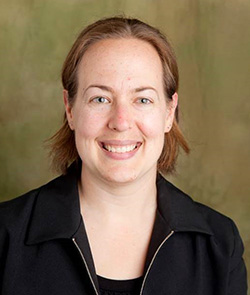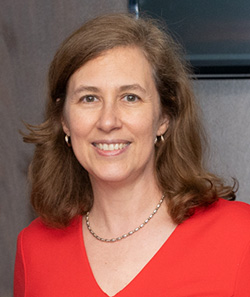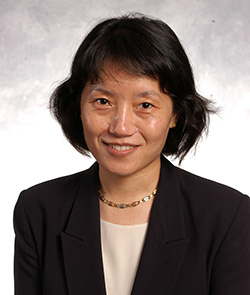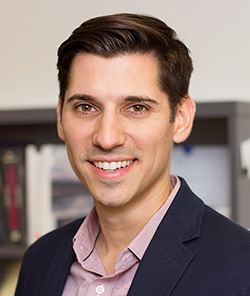Four Society Members Selected to Serve as 2018-2019 ASME Federal Fellows
Four Society Members Selected to Serve as 2018-2019 ASME Federal Fellows
For the past 45 years, the ASME Federal Government Fellowship Program has offered engineers the opportunity to share their engineering and technical expertise with U.S. legislators during the policy-making process. Four Society members have been selected to serve as ASME Federal Fellows in 2018-2019.
Since the program was launched in 1973, 125 ASME members have had the opportunity serve as ASME Federal Fellows, providing technical advice to policy makers and key federal agencies as independent, unbiased advisors in engineering, science and technology.
One of the four new Fellows, Laurel Kuxhaus, began her term last month as an ASME Congressional Fellow in the office of the Honorable Daniel Lipinski (D-IL), who is a member of both the House Committee on Science, Space and Technology and the Committee on Transportation and Infrastructure, as well as one of the few members of Congress with an engineering degree. A member of the mechanical and aeronautical engineering faculty at Clarkson University since 2009, Dr. Kuxhaus’ Fellowship is sponsored by ASME Government Relations, the ASME Bioengineering Division and the ASME Foundation.
With a focus on the area of orthopedic biomechanics, Kuxhaus’ research primarily deals with the study of injury biomechanics, including meniscal tears or vertebral fractures, and the design of orthopedic and assistive technology devices. A committed advocate for the improvement of biomechanics education, Kuxhaus is a former member of the ASME Bioengineering Division executive committee and former chair of the division’s Education Committee.
According to Kuxhaus, her motivations for applying to be an ASME Congressional Fellow included a desire to learn how U.S. public policy is shaped, expand her network of connections, and have the opportunity to personally experience working on Capitol Hill. “I wanted to use my one-year sabbatical from my academic position to do something radically different, to be in the learner’s seat instead of being the teacher, and to better understand the interface between science, technology, engineering and public policy,” she said. “At a minimum, I expect to include public policy awareness in future classes that I teach and bring an awareness of the policy-making process to my laboratory research.”
KC Morris, the leader of the Information, Modeling and Testing Group in the Engineering Lab at the National Institute of Standards and Technology (NIST), also began her term as a 2018-2019 ASME Congressional Fellow in October. Morris, whose Fellowship is sponsored by ASME Government Relations and the ASME Foundation, is serving in the office of Rep. Thomas Reed (R-NY). An expert in computing and engineering information systems and standards development for digital manufacturing with 30 years of experience, Morris’ current research concentrates on introducing smart technology into the manufacturing sector and developing new practices for more competitive and sustainable manufacturing.
Although she has spent the past 30 years as a researcher at NIST leading projects related to standards that support the integration of manufacturing systems, the past six years have seen her take on even larger leadership roles in this area, according to Morris. “As a researcher, most of the focus is on the deep technical understanding of the ‘what’ and ‘how’ of the things we do,” she said. “But as a leader, one is faced more and more with the questions of ‘why’ we do things and what is it that we should be doing — where should we be putting our energy. I believe the ASME Congressional Fellowship will allow me to explore the why questions more fully both in light of my role as a government employee and as a citizen of our country and the world.”
On Dec. 1, the third new Fellow, Hong Liang, will begin her yearlong term as the 2018-2019 ASME Foundation Swanson Fellow at NIST’s Advanced Manufacturing National Program Office (AMNPO) in Gaithersburg, Md. The Swanson Fellowship was established in 2010 in recognition of Dr. John A. Swanson, who is internationally recognized as an authority and innovator in the application of finite element methods to engineering. The Swanson Fellowship is designed to provide a unique opportunity for experienced engineers to serve as Federal Fellows in the Executive Branch where they can apply their broad, multi-disciplinary background toward solutions to technical issues.
Dr. Liang is the Oscar S. Wyatt Jr. Professor of Mechanical Engineering at Texas A&M University, where her research work focuses on areas including advanced materials, structures and nanomanufacturing focusing on surface science, interface engineering and tribology. Liang, who is an ASME Fellow, has served as editor of Tribology International, North American regional editor of Surface Topography: Metrology and Properties, associate editor of the journal Friction, as well as a member of other journal editorial boards.
“The Advanced Manufacturing National Program Office at NIST is a natural fit for me,” Liang said of her Swanson Fellowship, noting that her years of research activities in the manufacturing realm have prepared her for the opportunity. Although the fellowship hasn’t technically yet begun, Liang said she had “already learned a great deal from former ASME Foundation Swanson Fellows. In particular, I am inspired by their thinking processes and am learning to look at things at multilevel scales and angles. The Swanson Fellowship provides a great opportunity for me to learn and support the United States’ advanced manufacturing initiatives as part of a nationwide manufacturing agenda.”
The fourth new Fellow, Marc Santos, will begin his term as a 2019 ASME Congressional Fellow on Jan. 2. During his Fellowship — sponsored by ASME Government Relations, the ASME Petroleum Division and ASME Foundation — Santos will serve in the office of Sen. Christopher Coons (D-DE), a member of the Senate Appropriations, Foreign Relations, Judiciary, Small Business and Entrepreneurship Committees as well as the founder of the Senate Competitiveness Caucus. An associate at the water engineering company Hazen and Sawyer, Santos works in research, planning, design, construction and operations solutions for drinking water and wastewater treatment and transmission systems.
Santos’ Congressional Fellowship isn’t his first high-profile ASME post. He had previously served as the 2008 ASME Washington Internship for Students of Engineering (WISE) Intern, the WISE Subcommittee chair on the ASME Committee on Government Relations, and as an executive committee member for the ASME Volunteer Orientation and Leadership Training (VOLT) Academy.
It was during his time as a WISE intern that Santos “caught the policy bug” that led him to eventually apply for an ASME Congressional Fellowship, he said. “Even at that time, I knew I wanted to return to Washington, D.C., to serve as a technical resource for Congress,” he continued. “In recent years as a practicing engineer, I’ve learned more about the regulations and policies that that impact my work, and the fellowship program provides the opportunity to become a part of the policy making process. Along the way, I’m hoping to gain a sound understanding of the political process to be able to advocate at the appropriate times and assist in developing sensible policies that affect my industry.”
ASME is currently accepting applications for three 2019-2020 ASME Congressional Fellowships with expertise in Energy, Bioengineering and Manufacturing through Jan. 31, 2019. To learn more about the 2019-2020 Fellowships, or for more information on the ASME Federal Government Fellowship Program, visit Federal Fellows Program.







